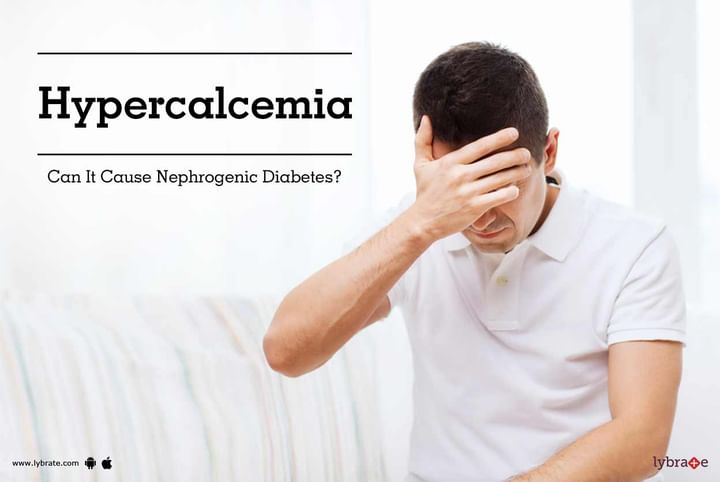Hypercalcemia - Can It Cause Nephrogenic Diabetes?
Calcium is a free ion in our blood. It is used by organs and organelles for normal functioning and it is used for blood clothing and bone formation. Calcium concentration in our serum/blood is 8.6 to 10.3 mg/dL. When this range of calcium concentration gets elevated or decreased in our blood it causes hypercalcemia or hypocalcemia respectively.
There are free ions of calcium(50%), calcium bound to protein(40%) and the rest are calcium associated compounds(10%). In our blood hypercalcemia is caused by only an increase in free ion calcium.
Classification of hypercalcemia:
-
Mild hypercalcemia- It is caused when blood calcium concentration is above 10.3mg/dL to 12mg/dL.
-
Moderate hypercalcemia- It is caused when blood calcium concentration is between 12mg/dL to 14mg/dL.
-
Severe hypercalcemia- It is caused when blood calcium concentration is above 14mg/dL.
The causes of hypercalcemia:
-
Hyperparathyroidism: There is a thyroid gland in the neck behind it located four small glands called parathyroid glands. There is a hormone called parathyroid hormone in blood which is produced by these glands. This parathyroid hormone(PTH) regulates calcium concentration in blood. When one or more of parathyroid glands gets overaced and starts to produce more PTH than required in blood, there is a rise in calcium concentration in blood which cannot be corrected by the body. This rise in calcium causes hypercalcemia. This is less common in men than women(2 to 3 times more). Parathyroidectomy is the treatment given to patients with hyperparathyroidism related hypercalcemia.
-
Cancer at a malignant stage can cause hypercalcemia. For example- paraneoplastic syndrome is when cancer fighting antibodies start to do damage to normal cells because of malignancy of that cancer or metastasis. In this response there is a high rise in calcium concentration in blood which causes malignancy associated with hypercalcemia. Cancer can occur in different parts of the body like head, lung, breast and nervous system etc. According to which there are different syndromes associated with hypercalcemia.
-
Granulomatous diseases like tuberculosis and sarcoidosis. They are lung damaging diseases that increase your vitamin D levels in blood. As vitamin D helps in absorption of calcium from food therefore there is more increase in calcium in blood. So as long as granulomatous diseases are there, there is a possibility of hypercalcemia.
-
Medicines of calcium or vitamin D overdose can be the cause of hypercalcemia.
Kidneys function to filter the blood and maintain the concentration of calcium and other minerals. Due to any failure kidney lacks its efficiency, so there is increase of calcium in blood causing hypercalcemia.
Note :
Any disorder in the body increases bone resorption, increases renal reabsorption or decreased excretion, increased gut absorption will cause hypercalcemia.
Hypercalcemia’s clinical features:
-
In a few patients it is asymptomatic.
-
Hypercalcemia affects the central nervous system which causes lethargy, depression, psychosis, and stupor.
-
Hypercalcemia can affect neuromuscular muscles which causes weakness in the body, proximal myopathy (weakness in upper or lower limbs), it causes stiffness in muscles or chronic cramp due to many tones of muscles called hypertonia.
-
It may have cardiovascular effects like hypertension, bradycardia ( it is the condition in which there is slow heart rate fewer to less than 60/min0, and shorter QT interval ECG).
-
Kidneys may fail due to hypercalcemia or stones may be positioned by the process called nephrocalcinosis.
-
There can be chronic vomiting, constipation, Band keratopathy is the condition of the corneal(eye) in which there is calcium dust deposition which degenerates it and looks somewhat milky.
Diagnosis:
Can hypercalcemia cause nephrogenic diabetes?
Yes, hypercalcemia can cause nephrogenic diabetes.
Our kidneys function to filter blood to remove waste. It removes the waste from the fluid of the bloodstream and the left fluid portion is added back to the bloodstream. The waste small part of fluid makes urine. Urine is temporarily stored in the bladder and excreted at the right time.
Antidiuretic hormone (ADH), or vasopressin, is a hormone made in the brain part called hypothalamus. It is stored in a small gland at the base of the brain named as pituitary gland. This ADH hormone is used by the kidney at filtration, ADH regulates the balance of fluid between intake and given fluid after filter. Many conditions cause deficiency in production of ADH hormone or error in its working path mechanism. This causes imbalance in fluid at the kidney so we urinate excessively which is called diabetes insipidus.
There are three types of diabetes insipidus:
-
Central diabetes insipidus
-
Nephrogenic diabetes insipidus
-
Gestational diabetes insipidus
Nephrogenic diabetes insipidus: At hypercalcemia there is high calcium in blood. Exposure of hypercalcemia to the kidney goes in a process called nephrocalcinosis. It is calcification of calcium in kidney structures which causes stones in calcium. When there is prolonged stones exposures there is change in structures of the kidney due to which ADH hormone cannot function at the kidney properly. This causes nephrogenic diabetes insipidus and people urinate excessively and body fluids get imbalanced.
ADH causes tubules of kidney to become more permeable so that selective reabsorption can be done easily and more fluid can be sent back to the bloodstream..
There may be defects due to an inherited (genetic) disorder. High dosage of medicines like foscarnet (Foscavir) or lithium or antiviral drugs can cause nephrogenic diabetes insipidus.
Symptoms:
Normal signs diabetes insipidus include:
-
Thirsty like a crow.
-
Pale urine is produced in large amounts.
-
During the night we want to urinate many times.
-
Mostly we preferred cold drinks.
In young child signs may somewhat differ
-
Heavy, wet diapers many times.
-
Bed-wetting
-
Trouble sleeping
-
Fever
-
Vomiting
-
Constipation
-
Delayed growth
-
Weight loss
Conclusion:
Yes, hypercalcemia causes nephrogenic diabetes insipidus. Our unhealthy ways or mutations disturb the hormones in the body which cause hypercalcemia.To keep the kidney healthy is the main goal here. We should visit a doctor for treatment and consultation.



+1.svg)
